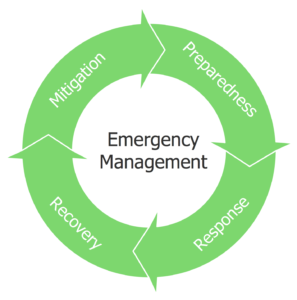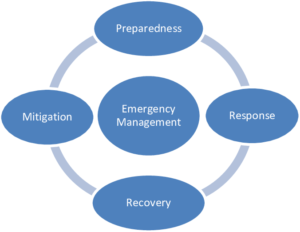Back to: Religion and National Value JSS2
Welcome to class!
In today’s class, we’re going to be talking about Basics of emergency management. I trust you will enjoy the class!
Basics of Emergency Management

Emergencies can happen anytime and anywhere. They can be natural disasters like floods or earthquakes, or they can be human-caused like fires or accidents.
Religious Perspective: Many religions teach the importance of helping others in times of need. This is a core principle of emergency management.
National Values: In Nigeria, unity and resilience are important values. Emergency management helps us come together and overcome challenges.
Types of Emergencies

- Natural Disasters:
Floods: Heavy rains can cause rivers to overflow, damaging homes and crops.
Earthquakes: The ground shakes violently, causing buildings to collapse.
Droughts: A long period without rain leads to water shortages and crop failures.
Wildfires: Uncontrolled fires spread quickly, destroying forests and homes.
- Human-Caused Disasters:
Fires: Accidents or carelessness can cause fires in homes, schools, or workplaces.
Accidents: Car crashes, industrial accidents, or spills of hazardous materials.
Conflict/Violence: Wars, riots, or acts of terrorism can displace people and cause injuries.
Phases of Emergency Management

- Mitigation: Taking steps to reduce the risk of an emergency happening or to lessen its impact.
Example: Building stronger houses in earthquake-prone areas.
- Preparedness: Planning and preparing for what to do in case of an emergency.
Example: Having a family emergency kit with food, water, and first aid supplies.
- Response: Taking action during an emergency to save lives and protect property.
Example: Firefighters putting out a fire or rescue workers helping people evacuate.
- Recovery: Rebuilding and restoring communities after an emergency.
Example: Providing shelter and food for people who have lost their homes.
Religious and National Values in Emergency Management
Love and Compassion: Helping those in need is a central teaching of many religions.
Unity: Working together as a community strengthens our response to emergencies.
Resilience: The ability to bounce back from adversity is a key national value.
Selflessness: Putting the needs of others before our own is an act of heroism.
Faith: Trusting in a higher power can give us strength during difficult times.
What Can You Do?
Be Prepared: Know the risks in your area and have a plan.
Get Involved: Volunteer with organizations that help in emergencies.
Spread Awareness: Teach others about emergency preparedness.
Be Kind and Helpful: Offer assistance to those in need.
Pray for Strength and Guidance: Ask for divine help in times of crisis.
Remember, being prepared for emergencies is not only a matter of practical skills, but also an expression of our religious and national values. By helping one another and working together, we can overcome any challenge.
We have come to the end of today’s class. I hope you enjoyed the class!
In the next class, we shall be discussing prevention strategies for common crimes.
In case you require further assistance or have any questions, feel free to ask in the comment section below, and trust us to respond as soon as possible. Cheers!
